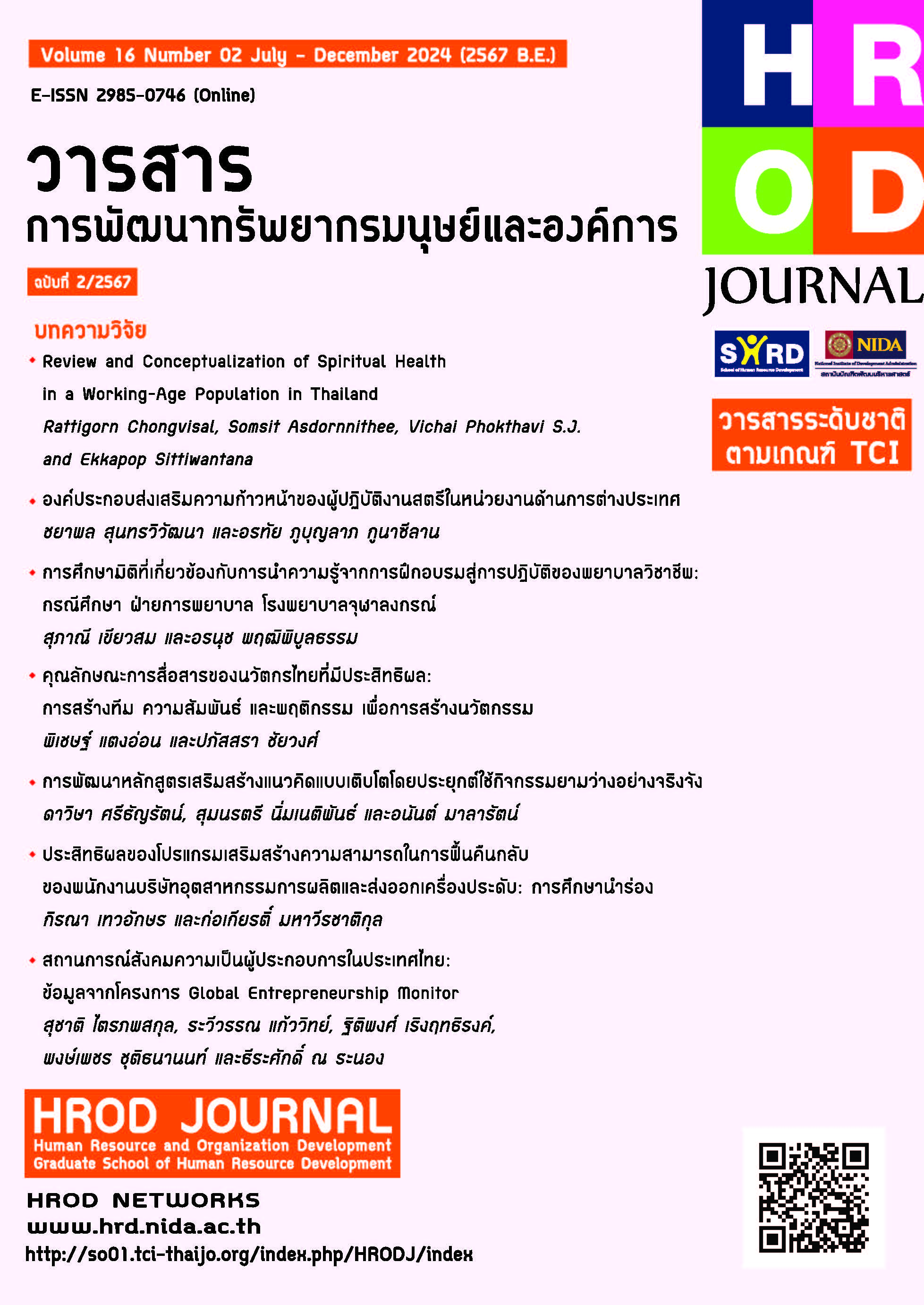Applying Serious Leisure in Developing the Curriculum to Strengthen Growth Mindset
Main Article Content
Abstract
A growth mindset is one of the most frequently mentioned goals of human resource development. A growth mindset could affect employees’ professionalism, performance, creativity, and positive relationships at work. However, HRD mainly focuses on work-based approaches. According to the previous research, serious leisure could be utilized as an approach and tool to yield HRD results. Integrating HRD with leisure studies could benefit both academia and practice for both disciplines. This study holds two objectives: 1. to apply serious leisure in developing a curriculum to strengthen a growth mindset, performed through systematic literature review, need analysis of stakeholders, and prototype development and verification, and 2. to test the newly developed curriculum through quasi-experimental design research. Data were collected from learners were analyzed statistically. The results reveal a significant change in learners’ level of serious leisure behavior and level of growth mindset, especially after they had been through the whole process of the curriculum, including knowledge development, reflection, workshop and group activities, and learning by doing. The results can benefit scholars and practitioners. The important elements and mechanisms of the curriculum were reported for implications. Also, the outcomes of implementing this curriculum are reported to be successful in strengthening learners’ serious leisure behaviors and growth mindset. The implications can be performed in either academia to nurture the collaboration between the field of HRD and leisure studies, or practices in using the newly developed curriculum in developing employees.
Article Details

This work is licensed under a Creative Commons Attribution-NonCommercial-NoDerivatives 4.0 International License.
1) The content of article in HROD journal is the author’s wholly responsibility to research, analyze, summarize, compile, and reference data. The editorial department will not be responsible in anyway.
2) The submitted articles in HROD journal must be unpublished before and must not be currently under consideration for publication elsewhere. If it is detected for its repetition, the author must be responsible for infringement of copyright.
3) Authors will be asked to transfer copyright of the article to the Publisher. The article is prohibited to reproduce all or part of the text, unless allowed.
References
รมสวัสดิการและคุ้มครองแรงงาน. (2565). จำนวนสถานประกอบกิจการกรุงเทพมหานคร. https://eform.labour.go.th/dlpwMapWeb/map/
ชยาภพ ภูมิเหล่าแจ้ง. (2561). อิทธิพลของเกม MOBA กับรูปแบบภาวะผู้นำ [วิทยานิพนธ์ระดับปริญญาโท]. สถาบันบัณฑิตพัฒนบริหารศาสตร์.
ชัชวาลย์ ศิลปกิจ, อรวรรณ ศิลปกิจ, และ รสสุคนธ์ ชมชื่น. (2558). ความตรงของแบบวัดชุดความคิด. วารสารสุขภาพจิตแห่งประเทศไทย, 23(3), 166-174.
ดาวิษา ศรีธัญรัตน์. (2564). รายงานผลการวิจัยเรื่องการพัฒนาระบบ (Platform) การฝึกอบรมและพัฒนาเพื่อส่งเสริมทักษะที่จำเป็นสำหรับอนาคตของทรัพยากรมนุษย์โดยใช้กระบวนการนันทนจิต. กองทุนส่งเสริมวิทยาศาสตร์ วิจัยและนวัตกรรม (กสว.).
ดาวิษา ศรีธัญรัตน์, อัสมา เต๊ะหมาน, วนิดา ทองธีระ, และ ธวัลพร มะรินทร์. (2565). ความสัมพันธ์ของนันทนจิตอย่างจริงจังกับการมีกรอบความคิดแบบเติบโตของคนวัยทำงานในกรุงเทพมหานคร. วารสารการพัฒนาทรัพยากรมนุษย์และองค์การ, 14(1), 1-24.
สำนักงานสภาพัฒนาการเศรษฐกิจและสังคมแห่งชาติ. (2564). รายงานสรุปผลการดำเนินการตามยุทธศาสตร์ชาติ ประจำปี 2563: การพัฒนาการเรียนรู้. http://nscr.nesdc.go.th/nesdc_uat/wp-content/uploads/2021/02/NS-12_438-449.pdf
Beatty, E. J., & Torbert, R. B. (2003). The false duality of work and leisure. Journal of Management Inquiry, 12(3), 239–252. https://doi.org/10.1177/1056492603256340
Blackwell, L. S., Trzesniewski, K. H., & Dweck, C. S. (2007). Implicit theories of intelligence predict achievement across an adolescenttransition: A longitudinal study and an intervention. Child Development, 78(1), 246– 263. https://doi.org/10.1111/j.1467-8624.2007.00995.x
Cohen, J. (1988). Statistical power analysis for the behavioral sciences (2nd ed.). Lawrence Earlbaum Associates.
Cooper, D. R., & Schindler, P. S. (2011). Business research methods (11th ed.). McGraw-Hill.
Copa, G. H., & Tebbenhoff, E. (1990). Subject matter of vocational education: In pursuit of foundations. Office of Vocational and Adult Education. https://search.ebscohost.com/login.aspx?direct=true&db=eric&AN=ED322318&authtype=ip,cookie,uid
Creswell, J. W., & Creswell, J. D. (2005). Mixed methods research: Developments, debates, and dilemmas. In R. A. Swanson & E. F. Holton (Eds.), Research in organizations: Foundation and methods of inquiry (pp. 315-326). Berrett-Koehler.
Dweck, C. S. (2012). Mindset: How you can fulfill your potential. Ballantine Books.
Dweck, C. S., Walton, G. M., & Cohen, G. (2014). Academic tenacity: Mindsets and skills that promote long-term learning. Bill & Melinda Gates Foundation. https://search.ebscohost.com/login.aspx?direct=true&db=eric&AN=ED576649&authtype=ip,cookie,uid
Gould, J., Moore, D., McGuire, F., & Stebbins, R. A. (2008). Development of the serious leisure inventory and measure. Journal of Leisure Research, 40(1), 47–68. https://doi.org/10.1080/00222216.2008.11950132
Han, S. J., & Stieha, V. (2020). Growth mindset for human resource development: A scoping review of the literature with recommended interventions. Human Resource Development Review, 19(3), 309–331. https://doi.org/10.1177/1534484320939739
McLean, G. N., & McLean, L. D. (2001). If we can’t define HRD in one country, how can we define it in an international context? Human Resource Development International, 4(3), 313–326. https://doi.org/10.1080/13678860110059339
Morris, M. L., & Madsen, S. R. (2007). Advancing work—life integration in individuals, or- ganizations, and communities. Advances in Developing Human Resources, 9(4), 439–454. https://doi.org/10.1177/1523422307305486
Neufeldt, V. (Ed.). (1998). Webster’s new world dictionary: Third college edition. Book Prentice Hall.
Petrou, P., Bakker, A. B., & Van den Heuvel, M. (2017). Weekly job crafting and leisure crafting: Implications for meaning-making and work engagement. Journal of Occupational and Organizational Psychology, 90(2), 129–152. https://doi.org/10.1111/joop.12160
Rouna, W. E. A. (2005). Analyzing qualitative data. In R. A. Swanson & E. F. Holton (Eds.), Research in organizations: Foundation and methods of inquiry (pp. 233-263). Berrett-Koehler.
Russ-Eft, D. F., & Hoovers, A. L. (2005). Experimental and quasi-experimental designs. In R. A. Swanson & E. F. Holton (Eds.), Research in organizations: Foundation and methods of inquiry (pp. 75-95). Berrett-Koehler.
Sperling, J. (2018, July 16). Changing mindsets and behavior, one “nudge” at a time. https://www.mckinsey.com/capabilities/people-and-organizational-performance/our-insights/the-organization-blog/how-to-change-mindset-and-behavior
Sritanyarat, D., Tehmarn, A., Thongteera, W., Marin, T., & McLean, G. N. (2023). Serious leisure as human resource development intervention. Human Resource Development Review, 22(3), 388–413. https://doi.org/10.1177/15344843231184746
Stebbins, R. A. (1992). Amateurs, professionals, and serious leisure. McGill-Queen’s University Press.
Torraco, R. J. (2005). Writing integrative literature reviews: Guidelines and examples. Human Resource Development Review, 4(3), 356–367. https://doi.org/10.1177/1534484305278283


